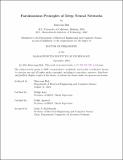Parsimonious Principles of Deep Neural Networks
Author(s)
Huh, Minyoung
DownloadThesis PDF (34.17Mb)
Advisor
Isola, Phillip
Agrawal, Pulkit
Terms of use
Metadata
Show full item recordAbstract
At the core of human intelligence lies an insatiable drive to uncover the simple underlying principles that govern the world’s complexities. This quest for parsimony is not unique to biological cognition but also seems to be a fundamental characteristic of artificial intelligence systems. In this thesis, we explore the intrinsic simplicity bias exhibited by deep neural networks — the powerhouse of modern AI. By analyzing the effective rank of the learned representation kernels, we unveil the observation that these models have an inherent preference for learning parsimonious relationships in the data. We provide further experimental results to support the hypothesis that simplicity bias is a good inductive bias for finding generalizing solutions. Building upon this finding, we present the Platonic Representation Hypothesis — the idea that as AI systems continue to grow in capability, they will converge toward not only simple representational kernels but also a common one. This phenomenon is evidenced by the increasing similarity of models across domains, suggesting the existence of a Platonic “ideal” way to represent the world. However, this path to the Platonic representation necessitates scaling up AI models, which poses significant challenges regarding computational demand. To address this obstacle, we conclude the thesis by proposing a framework for training a model with parallel low-rank updates to effectively reach this convergent endpoint.
Date issued
2024-09Department
Massachusetts Institute of Technology. Department of Electrical Engineering and Computer SciencePublisher
Massachusetts Institute of Technology